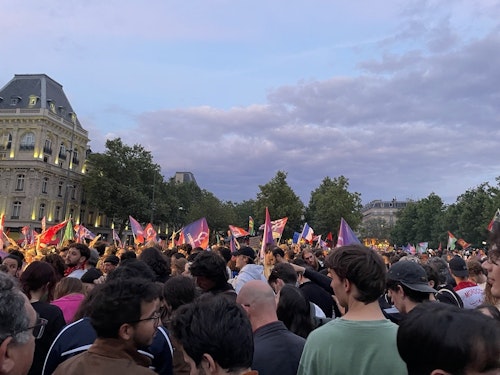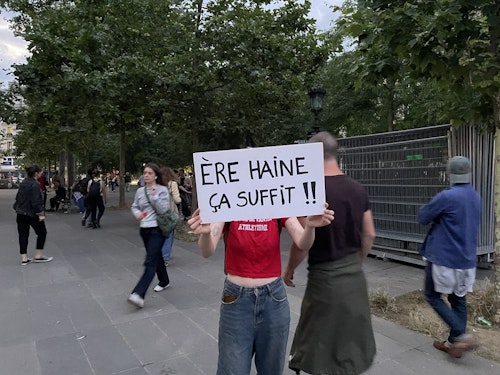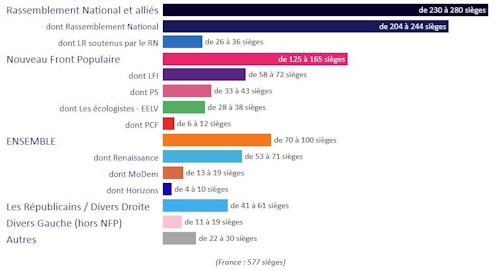The National Rally put in a strong performance in the first round of legislative elections, and other parties are now discussing which tactics can block Marine Le Pen from power.
Snap legislative elections have seen a strong performance by the far-right National Rally, which for the first time topped the poll to elect 577 representatives of the National Assembly.
They spell bad news for French President Emmanuel Macron, who called the snap vote after a poor performance in European Parliament elections on 9 June.
Initial results from Ipsos suggest that Marine Le Pen's National Rally will take around 33% of the vote, with left-wing bloc the New Popular Front second on 28.1%. Macron is pushed into third place with 21%, leaving his coalition in its weakest state ever.
The results are already drawing comment from within and outside France - with candidates plotting strategies for how to succeed in a second round of elections due on 7 July, and observers from the EU fearing a swing to the right in one of the bloc's most stalwart members.
Find all our stories on our French elections hub.

 ${title}
${title}
Live ended
Thank you so much for tuning in with us!
That's all for this eventful evening.
But hold tight—our coverage of the French legislative elections is far from over. Join us again tomorrow on the Euronews website for in-depth analysis, lively reactions, and insightful commentary. And mark your calendars for next week, as we liveblog the second round results as they happen.
Have a great night!

Who’s in? Who’s out?
After an eventful evening in French politics, here's a quick look at what happened to some of the most notable candidates.
In for the second round:
- François Hollande, NFP: Former French President (2012-2017) came in first in Corrèze with 37.63% of the votes.
- Marie-Caroline Le Pen, RN: Marine Le Pen's sister (and Jordan Bardella's stepmother) came in first in Sarthe. It's the first time she has achieved this score, 39.26%, after four attempts.
- François Ruffin, NFP: A former ally turned rival of Mélenchon, he is among the names being considered for Prime Minister in case of a left-wing victory.
- Yaël Braun-Pivet, Renaissance: The former President of the National Assembly is on track for re-election.
Barely in (or almost out):
- Elisabeth Borne: Borne, Prime Minister from 2022 until 2024, managed to reach the second round with a score of 28.48%. The withdrawal of the NFP rival who came third could bolster her chances.
- Jean Lassalle and Philippe Poutou: Two familiar faces from TV debates and candidates of small, outsider parties in previous presidential elections, both have slim chances of being elected in the second round. But the similarities end there. The former is from the conservative right and the latter a Trotskyist.
Out:
- Jérôme Cahuzac: Former deputy and minister under François Hollande, known for being convicted of tax fraud. He came in 4th place with 14% of the votes.
- Fabien Roussel: The National Secretary of the French Communist Party was blocked in the first round. He had been a deputy since 2017.
- Sabrina Agresti-Roubache: The Secretary of State for Urban Affairs and Citizenship qualified for the second round but withdrew in favor of an NFP candidate.
At least 46 candidates already elected, avoiding a second round
The final results are not yet fully known, but 46 candidates will sleep soundly tonight. High turnout in this election (69%) allowed them to be elected to the National Assembly without the need for a second round.
- Most of those, 37 in fact, are from tonight's victors the National Rally, including Marine Le Pen and Sébastien Chenu, the party's vice president.
- Five are from the left-wing New Popular Front. Two are members of La France Insoumise: Manuel Bompard, close to Mélenchon and rumored for a Prime Ministerial post, and Mathilde Panot, president of the group in the National Assembly. One colleague from the Greens, Sandrine Rousseau will join as well as two from the Socialist Party: Olivier Faure, First Secretary of the party, and Martine Froger, outgoing deputy from Ariège.
- Only one candidate from Emmanuel Macron's coalition was directly elected, from Wallis and Futuna.
- Two independents have also been elected in French Polynesia and Mayotte.
Under French election law, candidates can avoid a second round challenge if they get more than 50% of the votes from over a quarter of eligible voters in their constituency.
As a reminder, in 2022, only 5 candidates achieved that feat, all from the left-wing France Insoumise party.
Vote counting is still ongoing, and new deputies could still be elected overnight.

French election results raise eyebrows in Brussels
The far-right win in France is already drawing attention from politicians further afield.
Iratxe García Pérez, president of the centre-left Socialists grouping in the European Parliament, posted that the results are "more than worrying."
"Yesterday the far-right was at the gates of power; now those are lying ajar", said the Spanish MEP, calling for unity in the face of fear and hate.
Stand by for more of this kind of intervention.
France has been one of the traditional motors of the EU project. The idea that this dynamic could be paralysed by political deadlock, or, worse still, captured by far-right ideology, will be causing sleepless nights for many in Brussels.
Les résultats des élections législatives françaises sont plus qu’inquiétants. Hier, l’extrême droite était aux portes du pouvoir. Aujourd’hui, celles-ci se sont entrouvertes.
— Iratxe García Pérez /❤️ (@IratxeGarper) June 30, 2024
Il est maintenant impératif de nous unir pour l'arrêter. Face à la peur et à la haine, la seule…
Is the French centre-right heading to the extremes?
One important takeaway from the election: the right wing electorate has gone to the far-right, a political analyst tells Euronews' Lauren Chadwick.
Guillaume Gourgues, a political scientist at the University of Lyon 2 , said that “The collapse of [Macron's party] Ensemble and Les Républicains leaves no doubt about the transfer of votes”.
The Republicans, the party of Charles de Gaulle and Nicholas Sarkozy, are the centre-right grouping that long dominated French politics, but are now polling at a paltry 10%, and there no longer seems to be a taboo about their voters heading further to the right.
Center-right Les Républicains party won't instruct its voters how to act
Influential figures from Les Républicains, historically France's main centre-right party, have said they won't tell their supporters how to vote in a second round of elections due 7 July.
The statement was published on X by the wing of the party that didn't support deposed leader, Eric Ciotti, who wanted to forge an alliance with the National Rally. More about Ciotti's exclusion from the party here.
“We oppose the excesses of a far-left dominated by La France Insoumise, which seeks to dismantle our institutions […]. The National Rally is no longer a solution for France, as its demagogic program will lead to chaos and impoverishment of our country,” the party members stated.
MEP François-Xavier Bellamy also declared to the press, “The danger facing our country today is the far-left.”
The party, heir to the right-wing parties that governed for 30 of the nearly 60 years of the Fifth Republic, is now only the fourth biggest political force in the country, with one of the lowest scores in its history (10%).
🔴 Communiqué de presse : réaction des Républicains à la suite du premier tour des élections législatives 2024. ⤵️ pic.twitter.com/itSFuRrwY5
— les Républicains (@lesRepublicains) June 30, 2024
Le Pen's victory prompts anti-fascist protest
Euronews Reporter Lauren Chadwick reports live from Paris, where protestors are decrying tonight's far-right victory.
Left-wing voters gathered in Paris' Place de la République after Marine Le Pen's party topped the legislative polls, a first under France's Fifth Republic.
One protestor held up a placard saying the "era of hatred, that's enough," a pun on the party's initials RN, while others rang out anti-fascist chants and spoke out against the party.
Eugenie, a 22 year old from Paris, said she was "ashamed" by the result, and that it was either crying at home or coming to protest.
‘This goes beyond France’, says leftist MEP
Leftist EU lawmaker Younous Omarjee, from the French territory of La Réunion, has told Euronews that it’s not just France affected by a swing to the right.
“The world today and Europe in particular is [impacted] by very reactionary forces … nationalism, xenophobia,” he said.
These issues “today have reached France”, but have grown in many European countries, he said.
All European politicians are considering these issues, he added, giving the example of the far-right Alternative for Germany's gains in recent European elections.
Omarjee said to ask what policies led to this electoral outcome, and that the left wants to convince voters of “another path” with more social policies.
It's still possible for the leftist coalition to win in the second round, he said.
Macron's party pledges to withdraw candidates to block National Rally
The centrist coalition “Ensemble,” which includes President Emmanuel Macron’s party, promised in a statement that they'll withdraw candidates who finish in third place in a three-way race involving the National Rally (RN), and to support candidates who uphold “the values of the Republic.”
The centrists acknowledge that Jordan Bardella's far-right party is closer than ever to gaining power: “With projections exceeding 200 seats for the RN, the only real risk today is that the National Rally could secure an absolute majority after the second round.”
La position de Renaissance a toujours été d'être un rempart face à l'extrême-droite.
— Renaissance (@Renaissance) June 30, 2024
Le 7 juillet, faisons le choix de la France. pic.twitter.com/FXNlV9od2T
How do you reach the magic 289?
Early projections published by Ipsos Talan suggest a number of ways these results could lead to a majority in the French National Assembly, meaning at least 289 of the chamber's 577 seats.
The most likely is for Le Pen's National Rally and friendly centre-right lawmakers, which Ipsos predicts could already be as many as 280 people, to reach out to other parties to secure the needed majority.
Depending on how results pan out, the left-wing New Popular Front (NFP) alliance could also just about combine with Macron's Ensemble party and the Republicans who aren't siding with Le Pen to gain control of the Assembly.
Those results need to be interpreted with caution. It's not the final results, and there's a wide margin of error included in the seat ranges. There's still a second round of voting to go next week which introduces extra uncertainty.
Crucially, Ipsos predicts that candidates will all remain in place - though left winger Jean-Luc Mélenchon has already said he'll withdraw those standing in three-way races to keep the National Rally from power.
At stake is the prize of getting to name a Prime Minister and government. But even if the maths works, there's still a question over how stable a super-coalition could be, given the existing NFP grouping is already pretty broad, including greens, communists and the centre-left socialists.
As Sophia Khatsenkova previously predicted, another outcome - likely, if unprecedented - is deadlock or chaos.
Bardella spotted leaving party HQ
Jordan Bardella, with his characteristic natural smile, was spotted by our journalist Sophia Khatsenkova leaving the venue shortly after his speech.
Surrounded by police and journalists, he did not respond to questions.
Next Sunday will be 'most decisive' vote in decades, says victorious Bardella
Jordan Bardella, whose National Rally is credited with 34% of the vote, thanked voters for taking his far-right party into the second round in "an overwhelming majority of constituencies" and said the results show voters "delivered a clear verdict and confirmed their clear desire for change".
"Next Sunday will be one of the most decisive in the history of the Fifth Republic," he said, adding that "clearly, in view of the results, the presidential camp, still largely disowned today, is no longer in a position to win".
He argued the choice facing French voters next week was between "the alliance of the worst" - meaning the left-wing Nouveau Front Populaire - which he claimed would "lead to disorder, insurrection and the ruin of our economy" and his own "unprecedented alliance, motivated by the national interest".
If National Rally secures a majority, he pledged he would be "the prime minister for all the people of France", "respectful of oppositions, open to dialogue and concerned at all times with the unity of the people".
He gave his priorities as boosting purchasing power, restoring order and security and "taking control of our migration policy."
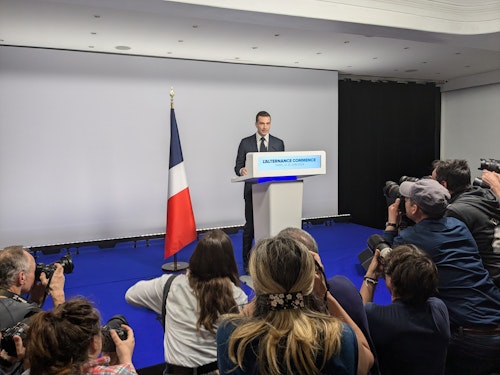
Left wingers say results as expected, and look ahead to second round
There was quiet as supporters of the left-wing New Popular Front saw the first election poll results on Sunday night at the gathering of leftist party La France Insoumise (LFI).
Two young supporters told Euronews that they had expected the high result for Marine Le Pen's National Rally, but that they were happy to be in second position. It’s a failure for a country to have such a high number of votes for the far-right, left-wing activists said.
Sarah Legrain, a candidate for the left-wing New Popular Front in Paris, reminded reporters that the election isn't over, with a further round due on 7 July.
“The subject is not to see how we catch up in the first round. It’s what will play out in the middle of these two rounds,” she said.
“I think the [high] mobilisation and participation show that we have lots of people who [are joining the] vote, people from disadvantaged neighbourhoods and young people .. and these people will determine the result of the second round, and to them I say: give us a majority for the New Popular Front,” she added.
Jean-Luc Mélenchon says leftist party will withdraw candidates in three-way races
Jean-Luc Mélenchon, founder of left-wing party La France Insoumise (France Unbowed), told supporters that the party will withdraw candidates in second-round three-way races in an effort to block the far-right National Rally from legislative power.
Mélenchon said they had clear instructions for left-wing voters to give “not one vote, not one seat more” to the Marine Le Pen's RN party.
"Nowhere will we allow the RN to win," he said.
He said, to applause, that current Prime Minister Gabriel Attal would no longer remain in office, and commended the young people that mobilised to vote for the coalition.
We are going towards a second round of “exceptional intensity," Mélenchon said.
“The country must choose whether it will heighten the worst of its divisions … or will it come together to form one people,” Mélenchon said.
“We have almost erased the Macronist bloc,” claims Marine Le Pen.
In a speech delivered to supporters gathered in her stronghold of Hénin-Beaumont, Marine Le Pen gave a victory address but also urged her voters to continue their efforts to combat the left-wing coalition she describes as dangerous: “Nothing is won yet and the second round will be decisive, decisive to prevent the country from falling into the hands of [the New Popular Front] and, in reality, a violent, anti-Semitic, and anti-republican far-left.”
She also emphasized that this is a crucial moment to enable her protégé, Jordan Bardella, to head to the Matignon and become Prime Minister. “Decisive, above all, to give Jordan Bardella an absolute majority in the National Assembly to begin, next week, France's recovery and the restoration of national unity and harmony.”
“In a democracy, nothing is more normal and healthy than political alteration to initiate this change,” she said.
EN DIRECT | Suivez ma soirée électorale des élections législatives du 1er tour depuis Hénin-Beaumont. #BardellaPremierMinistre https://t.co/v8vKlDmx2F
— Marine Le Pen (@MLP_officiel) June 30, 2024
Results are out: The National Rally leads the election
The far-right party has come out on top with 34% of the votes cast, followed by the left-wing coalition Nouveau Front Populaire with 28.1%. The presidential party trails behind with 20,3%, and the right-wing party Les Républicains stands at 10%, according to first results produced by Ipsos Talan.
More analysis and reactions on these results is coming soon.
Results in less than 10 minutes, and then what’s next?
Results are due very soon, so what to expect?
Polls taken last week placed the far-right National Rally in the lead, followed by the left-wing New Popular Front, and then the party of President Emmanuel Macron.
Even before the results are announced, a question arises: could opposing parties unite in some municipalities to push back against the far right in the second round, as many political figures are advocating?
Stay with us to find out more see the first reactions...
Jordan Bardella to tell voters 'the alternative starts now'
Journalists from around the world are setting up in Pavillon Wagram, in central Paris, to hear National Rally leader Jordan Bardella deliver his speech at 8.30pm local time.
No other party executive or supporter has been invited to join.
Marine Le Pen will speak at 8.10pm.
Bardella's slogan for the night: "L'alternance commence" or "The alternative starts now".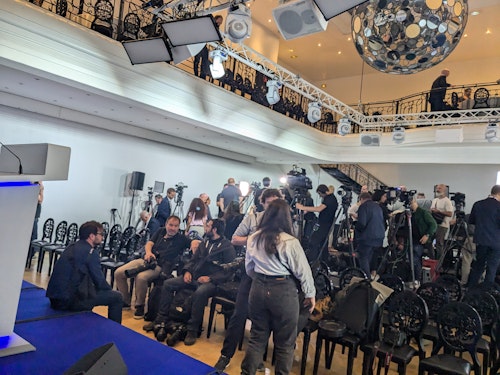
Results are coming in from France's overseas territories ✈️
We are already seeing some results from the French territories that lie outside Europe, given the differing timezones.
- New Caledonia: The region, gripped by riots since May, has seen participation nearly double since 2022, reaching 60%. Incumbent deputy Nicolas Metzdorf, who steered the bill at the center of the riots, topped the polls in the first constituency. In the second constituency, independence advocate Emmanuel Tjibaou leads with 44%.
- Guadeloupe: All four incumbent deputies from Guadeloupe have won their seats in the first round and qualify for the second round: Olivier Serva and Max Mathiasin of the LIOT catch-all parliamentary group, and Christian Baptiste and Hélène Vainqueur-Christophe, members of the left-wing New Popular Front coalition.
- Martinique: Candidates from the New Popular Front have secured the lead in all four constituencies.
- French Guiana: Similarly, with over 60%, both deputies from the New Popular Front are qualified for the second round.
Less than an hour remains until the complete results—stay tuned for projections and initial reactions!
A picture tells a thousand words
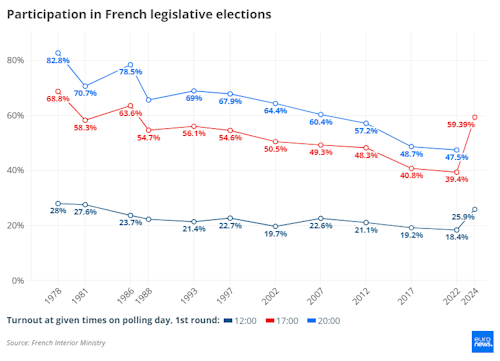
According to data from the French Interior Ministry, France has not witnessed such high voter turnout in legislative elections since 1986.
The 1986 elections were particularly significant as they resulted in the first cohabitation: Jacques Chirac, leader of the center-right coalition, became Prime Minister under Socialist President François Mitterrand.
Those elections also marked the first time candidates from the National Front, the antecedent to Marine Le Pen's current National Rally, entered the National Assembly.
“History doesn't repeat itself, but it often rhymes” - Mark Twain
Participation in French legislative elections
A Flourish data visualization by Jeremy Fleming-Jones
What if ... ?
What are the possible consequences of the elections?
Flashback to a story we published earlier this week, where our colleague in France, Sophia Khatsenkova, walks us through four possible outcomes of parliamentary elections.
- Macron's party obtains an absolute majority (very unlikely). The Prime Minister would remain Gabriel Attal.
- Macron's party is the largest, but no majority (as happened in 2022). The government struggles to govern alone and need alliances to pass laws.
- Another party gets a relative majority but can't secure allies (likely): government deadlock ahead.
- Another party wins the absolute majority (unlikely): the president will have to choose a Prime Minister from the winning coalition (either the far-right National Rally or the left-wing New Popular Front).
Click below to find out more ⤵️
France faces political paralysis: Four scenarios for the elections
French President Emmanuel Macron could end up with a prime minister and a government from a different party in a system known in France as “cohabitation”. What…
Voters voice election concerns from both left and right
The snap elections in France have led to heated political discussions across the country.
Both left and right-wing voters have told Euronews they are concerned about the possible outcome of today's elections.
Several right-wing voters said they wanted to block any possibility of a left-wing coalition, which includes the party founded by firebrand Jean-Luc Mélenchon, finishing first.
Voters at a public meeting for the leftist coalition, meanwhile, said they were worried about the far-right National Rally leading the government.
Here's what some of the voters that Euronews spoke with this week had to say about the political climate in France:
Manon, a 24-year-old voter from Toulouse, told Euronews that it’s important to vote and that “as a woman, as an LGBT person, for the rights of my trans friends, for rights of [minorities], I’m very scared”.
Alexandre, a 70-year-old retired construction worker outside of Lyon, said he was considering voting for the far-right and that President Emmanuel Macron had disappointed him “on many issues: work, retirement and health”.
Jean, a 30-year-old working for an environmental organisation, said the political situation in France was “very complicated and sad”. It's led to heated discussions in his own right-leaning family, he said, as his relatives believe the far-right National Rally has changed, while he disagrees.
We now know the first lawmaker elected by the 2024 vote
Polls haven't yet closed, but we already know of one successful candidate.
According to FranceInfo, Moerani Frébault was elected with 54% of the votes, and so won't have to face off in a second round of voting due next week.
He was standing in French Polynesia, where voters cast their ballots earlier.
The second round of parliamentary elections, due on 7 July, will include not only the top two candidates but also any who manage to secure the support of at least 12.5% of all those registered to vote in each constituency.
Today's high voter turnout may lead to more candidates than usual advancing to the second round of legislative elections.
If a third candidate qualifies, the contest would then become a triangular poll, which could split more traditional voters and hence favour the National Rally.
But top performers like Frébault can bypass the second round all together.
If a candidate garners over 50% of the votes and support from more than a quarter of eligible voters, they are elected outright. In 2022, only 5 out of 577 candidates achieved this.

Analysis: How Macron’s low approval has 'deregulated' France's political landscape
President Emmanuel Macron is in a difficult position amid an uncertain election for his presidential coalition, experts say.
It seems that, by creating a centrist movement that obliterated more moderate right and left-wing parties, Macron left a void in the political landscape now partly filled by the far-right National Rally.
“He deregulated the French political system that was traditionally marked by a right-left divide,” Stéphane Cadiou, a professor of political science at the University of Lyon 2, told Euronews.
“To make his personal (political) business profitable, he had to convince people of the outdated nature of the right-left divide by undermining all the familiar benchmarks of the political space,” said Cadiou.
Macron’s party has also been based on him as a presidential figure, so as his approval ratings dropped, so did support for his coalition.
Now, the president’s main argument to voters - that his party represents a block against extremism - may be a weakness.
Read our story on how Macron has changed France’s political landscape here.
How did Macron’s centrist movement alter French politics?
The French president has sold his party as a centrist force against extremism, but now he faces an uncertain election, and his strategy of pitting his presiden…
Who will be talking when?
Expect France's political leaders to deliver some major speeches in the hour after exit polls are released, starting at 8pm local time (CET).
Prime Minister Gabriel Attal will take to the stage at his Renaissance party headquarters in central Paris. It is unclear if President Emmanuel Macron will talk to the nation on Sunday evening.
Jordan Bardella, the 28-year-old leader of the National Rally, will also address supporters from the French capital. His mentor and former leader, Marine Le Pen, who heads the far-right group in the National Assembly, will meanwhile deliver her speech from her stronghold in Hénin-Beaumont, in northern France.
Some of the party leaders from the New Popular Front coalition will also talk more or less immediately after the exit poll comes out, including Fabien Roussel from the Communist Party. Several will gather at the Place de la République, in central Paris, after 10pm to address supporters.
Election day sees remarkably high voter turnout
There’s plenty of people turning out to vote today, according to the Ministry of the Interior.
As of 5pm today, nearly 60% of registered French voters had already cast their ballots. At the same time in 2022, the figure was just 39%; in 2017 it was 40%.
While this turnout is impressive relative to the last couple of decades, it’s unlikely to constitute a record for the Fifth Republic. The highest turnout for a first round in legislative elections was 82.8%, back in 1978.
#Législatives2024 I Taux de participation à 17h en France : 59,39%.
— Ministère de l'Intérieur et des Outre-mer (@Interieur_Gouv) June 30, 2024
🗳 En 2022, à la même heure, le taux de participation était de 39,42%.
📲 Pour en savoir plus ⤵️https://t.co/zBE0dRc1Hg pic.twitter.com/2AgvwA66IK
What are the key races to watch?
Among the hundreds of seats at stake in the elections are some that are going to be particularly eyebrow-raising.
Several French ministers hope to retain or win seats in parliament, though the president's coalition will likely face heavy losses.
Some key ministers running include Prime Minister Gabriel Attal, running for an Assembly seat in a constituency just outside of Paris; Interior Minister Gérald Darmanin, in the north of France; and Foreign Minister Stéphane Séjourné, who will be running for the first time in a national legislative election.
Former French President François Hollande is standing with the left-wing New Popular Front coalition in Corrèze, in southwestern France.
Certain constituencies also have dissident candidates running separately from the official party list. One of those races to watch is Danielle Simonnet, a lawmaker from the leftist party La France Insoumise (France Unbowed), after failing to be selected by her party to run in her Paris constituency with the new left-wing coalition the New Popular Front (NFP).
Raquel Garrido and Alexis Corbière are two others from La France Insoumise standing against NFP.
The first constituency of the southern Vaucluse region, which includes the city of Avignon, is also one to watch, as far-right National Rally lawmaker Catherine Jaouen will run against controversial antifascist activist Raphaël Arnault from the left-wing NFP, and rival left-winger Philippe Pascal, who is supported by Avignon’s socialist mayor.
Also, keep an eye out for the 62 candidates running on a joint list for the right-wing Republicans and far-right National Rally: especially in places where the Republicans party has pitted another candidate against them.
Huge number of voters register for proxy voting
More than 2.1 million people (including me!) have registered for proxy voting for these snap elections.
According to the Interior Ministry, that's twice the number who sought a proxy in 2022 legislative elections.
A total of 49.5 million voters are registered on the French electoral roll, including 1.6 million voting from abroad.
The elections were only announced on 9 June, and the very short campaign time meant no new voter could register in time for the first round.
If they registered in the week following the dissolution of the assembly, they should be able to vote in the second round on 7 July.
#legislatives2024 I Au 26 juin, @Interieur_Gouv comptabilise 2 124 918 procurations établies. C’est 2 fois plus que lors du dernier scrutin législatif ! Les 3/4 des procurations sont réalisées en ligne. Si vous souhaitez faire la vôtre, ne tardez pas !⌛️https://t.co/nYoi8pU8Nr
— Porte-parole ministère de l'Intérieur et Outre-mer (@CamilleChaize) June 27, 2024
More than 4,000 candidates for 577 constituencies - which party has more?
A total of 4,011 candidates are running for a seat in France's National Assembly, according to the interior ministry, an average of seven candidates per constituency.
This is significantly down from previous elections: in 2022, nearly 6,300 candidates registered in the first round while 7,877 did in 2017.
Reminder, there are 577 constituencies in France, which means that 289 seats are needed to secure an absolute majority.
Of the three main parties, Ensemble, the centrist coalition of President Emmanuel Macron, is fielding the fewest candidates and is in contention in 489 constituencies.
The New Popular Front, an alliance of left-wing parties, has registered nearly 560 candidates.
Meanwhile, the far-right National Rally, which has been leading in the polls, is running in 498 constituencies. It also has a stake in an additional 60 local races through the alliance it made with Eric Ciotti, president of the right-wing Republicans party.
The French are mobilising, at home and abroad
By midday today, more than one in four registered French voters had already cast their ballots.
That’s a significant increase compared to the last legislative poll in 2022, where turnout at the same time was just 18.43%.
More on voter turnout in the story from David O’Sullivan here.
This election is also drawing large crowds from those living outside the country. The Ministry of Foreign Affairs announced a record number of online votes from French citizens registered as expatriates, who were able to cast their ballots from 25-27 June. While 250,000 people voted this way in 2022, this year the number has risen to 410,000.
Turnout higher at mid-day than in previous French legislative election
Turnout is higher at mid-day than in the previous first round of French legislative election two years ago. #EuropeNews
Welcome to our liveblog for the first round of French legislative elections!
I’m Romane Armangau, and I’ll be your guide through this potentially pivotal day in the history of France’s Fifth Republic. As citizens head to the polls and results come in, we’ll explore the critical issues at play, capture the pulse of the nation with live reactions, and bring you up-to-the-minute insights from our reporters on the ground.
Stay tuned for all the latest twists and turns!












